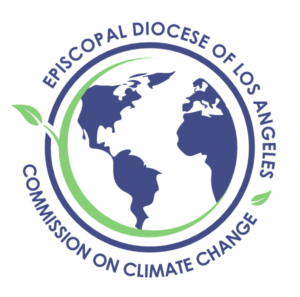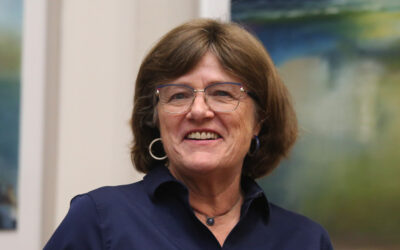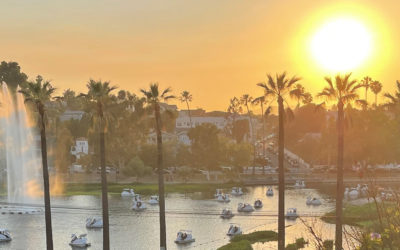
Resources & Response to the Wildfires
The following resources have been compiled to support all those impacted by the present crisis
Bishop’s Commission on Climate Change
Responding to the urgent global and local needs of the current environmental crisis, the Bishop’s Commission on Climate Change, comprising more than 20 members appointed from across the diocese, is actively engaged in these priorities:
- Advocating for a better response in the U.S. to climate change priorities
- Educating diocesan congregations, schools, institutions, and individuals in addressing climate change
- Engaging General Convention legislation calling dioceses, congregations, and individuals to action
- Increasing preparedness for natural disasters and responsiveness when they occur
In addition, the Commission is bringing attention to intersections of food insecurity and racial justice; tracking of federal, statewide, regional and local legislation; and development of an anthology of online resources. The role of youth and young adults, together with local schools and seminaries is also key.
Impetus for launching the Commission in March 2022 includes Diocesan Convention’s 2021 Margaret Parker Lecture given by Mary Nichols, parishioner of St. James’, Los Angeles, and a former longtime chair of the California Air Resources Board, who spoke just after her return from the United Nations COP26 meeting in Glasgow, Scotland. View her lecture here.
The Bishop’s Commission on Climate Change offered its first annual Climate Change Summit at St. Paul’s Commons in Echo Park on Saturday, September 16th. The program featured presentations from Dr. Lucy Jones, Kate Varley, Steve Slaten, Rev. Daniel Tamm, and Lisa Markus. Read a full report on the summit here.
Click below for further resources and to view initiatives that require urgent action:
Commission Chair
The Rev. Canon Melissa McCarthy | Contact: melissamccarthy@ladiocese.org
Commission Participants
In addition to Bishop John Harvey Taylor and the Rev. Canon Melissa McCarthy, commission participants include:
- Canon Robert Williams, diocesan staff liaison and canon for common life; parishioner at St. James in the City, Los Angeles
- Full List of Commission Members can be viewed here.
The commission meets virtually each month.
About the Commission on Climate Change’s Work
During the Episcopal Church’s 80th General Convention, the House of Bishop’s named the climate crisis an urgent concern that affects all issues of social justice. In a statement issued on the final day of the gathering, they proclaimed:
“As people of faith, we are not without hope, but the sustainability of God’s creation demands our action. Confronting climate change and environmental degradation has never been more urgent. As members of The Episcopal Church, we are committed in baptism to resist evil, seek God’s will, treat all people with dignity, and strive for justice and peace. Living into these promises, we must face the climate crisis for the sake of love of God and neighbor”
As part of this vital work, The Bishop’s Commission on Climate Change is committed to keeping congregations and communities of the Diocese of Los Angeles informed and inspired as we collaboratively respond to the developing climate crisis. The commission meets regularly to discuss developments, analyze priorities, and mobilize collective action.
Resource Guide
The Commission on Climate Change has compiled resources in key areas of interest and insight that will support parishes in the work of implementing sustainability and resiliency measures while connecting to the spiritual grounding that guides us in the work of creation care, Earth healing, and climate advocacy. Select a category to learn more about how you and your congregation can be involved.
To schedule an educational program, Climate Change 101: Hope is a Renewable Resource, for your congregation, click here.
For a general list of Climate Change resources including organization links, articles, books, practical and spiritual resources, click here.
Green Tips & Creation Care Commentary
Use in your church bulletin to nourish ecological faith in your congregation & community
Monarch Butterflies Need Our Help!
According to the Xerces Society for Invertebrate Conservation website, the latest season’s (late 2025) monarch count revealed the third lowest “overwintering” population ever recorded since tracking began in 1997. Only 12,260 butterflies were counted in 2025, joining the years 2020 and 2024 as representing the lowest counts. Habitat destruction, pesticides, and climate change have all caused decline of this iconic species. “Western monarchs are in serious trouble. The migration is collapsing,” said a senior conservation biologist with the Xerces Society. Monarch butterflies are vital to key ecosystems as pollinators of wildflowers and a food source for birds and other animals.
Take steps to give these fragile butterflies a fighting chance by planting native flowers attractive to monarchs. Monarch larvae need milkweed, especially native milkweed. Tropical milkweed interrupts the monarch’s natural migratory cycle and should be avoided and, ideally, removed if already planted. Adult monarchs need nectar resources to develop the fats in their bodies needed for their rigorous spring migration.
Some winter flowering plants good for monarchs in our region include lantana, verbena, achillea, coyote mint (Monardella species), goldenrod, sunflowers, black sage, Cleveland sage, fleabane, lemonadeberry, and manzanitas.
Climate Change Updates from the Episcopal News
First, move away from fossil fuels, says scientist and Episcopalian Lucy Jones at diocese’s first Climate Change Summit
[The Episcopal News] Moving from fossil fuel to electric energy is crucial for reducing carbon emissions to save the planet and can begin by simply switching appliances, Dr. Lucy Jones told attendees Sept. 16 at the first diocesan Climate Change Summit. “Buy electric,...
Diocesan Climate Change Summit set for Sept. 16 in Echo Park; all congregations asked to send representatives to hybrid event
[The Episcopal News] With July 2023 now on record as the hottest month worldwide, the Bishop’s Commission on Climate Change has set a summit meeting for Saturday, Sept. 16, at St. Paul’s Commons in Echo Park, asking each congregation in the Episcopal Diocese of Los...
Joie Zhang brings concern for climate crisis to Episcopal Church presence at UNCSW
[The Episcopal News] For Joie Zhang, 18, advocating for such global issues as climate change as a member of the presiding bishop’s delegation for the United Nations Committee on the Status of Women is both personal and pressing. “I still remember vividly the eerie...



